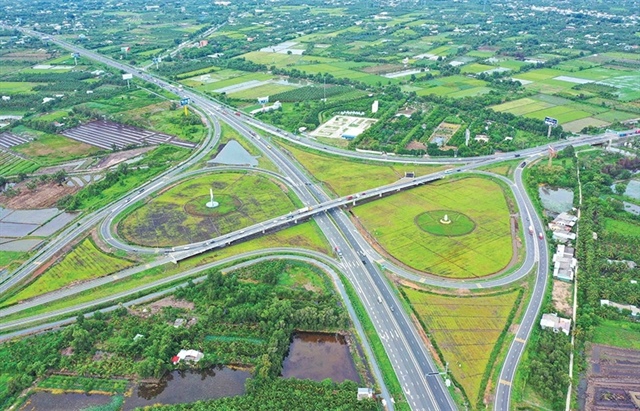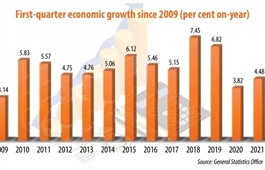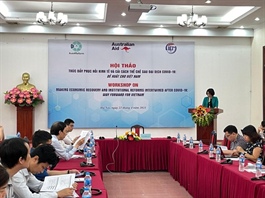Free trade deal increasing Vietnam’s allure to Brits
Free trade deal increasing Vietnam’s allure to Brits
The implementation of the UK-Vietnam Free Trade Agreement will be a boon to bilateral trade and investment between Vietnam and the United Kingdom moving forward. Kenneth Atkinson, executive chairman of Grant Thornton Vietnam, provides his insights into the wide-ranging deal.

Kenneth Atkinson, executive chairman of Grant Thornton Vietnam
|
The UK-Vietnam Free Trade Agreement (UVFTA) is one of the first signed and entered into by the UK after leaving the European Union on December 31 last year. The agreement reflects the importance both the UK and Vietnamese governments place on the strategic partnership developed over the last 10 years and the growing importance of the bilateral relationship between the pair.
A recent policy review submitted to the British parliament states “As an independent trading nation, the UK’s aim is to increase prosperity in all parts of the UK with a values-driven trade policy to open up markets and update international trading rules”. It further elaborates that “in the decade ahead, the UK will deepen their engagement in the Indo-Pacific, establishing a greater and more persistent presence than any other European country.”
The region is already critical to the UK economy and security, the review noted, and the UK will look to cement ties with South Korea and other regional powers such as Indonesia, Vietnam, Malaysia, and Singapore. The strong ties and the strategic partnership will therefore put Vietnam in a strong position to benefit from this policy.
In 2019, Vietnam was the UK’s 40th largest trading partner overall, accounting for 0.4 per cent of UK total trade (65th largest export market and 29th largest import market). Total trade between UK and Vietnam in goods and services totalled $7.97 billion in 2019. In terms of UK-ASEAN bilateral trade flows, Vietnam sits sixth behind Thailand, Indonesia, Philippines, Malaysia, and Singapore.
The UVFTA will make the Vietnamese market more attractive to UK companies through several main areas. First is increased access to public procurement markets. Continuing the access gained through the agreement means that British firms have more opportunity to bid for public procurement contracts in Vietnam. After a period of 15 years, the share reserved for domestic suppliers will be 50 per cent, with the remainder open to all suppliers with market access rights. Companies will also be supported by significant credit lines, available through UK Export Finance, at concessional interest rates.
Secondly, reducing regulatory barriers and overlapping red tape will also benefit access to Vietnam for small- and medium-sized British enterprises as well as through the Overseas Business Network Initiative. Operated by the British Chamber of Commerce in Vietnam, we have already seen an increase in market entry/access enquiries from UK companies through this.
I expect this to be particularly true with companies in the digital space (IT, fintech, digital health, and smart cities) where regulatory barriers have historically limited investment.
Another area is reduced tariffs on exports to Vietnam. The deal secures the immediate elimination of 65 per cent of all tariffs since the UVFTA entered into force, which will increase to 99 per cent of tariffs after seven years. This includes eliminating tariffs on machinery and mechanical appliances, the UK’s top export to Vietnam, and pharmaceutical products, the UK’s second-largest export. On the Vietnamese side, exports of clothing and footwear will benefit immediately as will electronic items such as mobile phones.
Vietnam’s commitment to higher international standards, for example on international labour standards and sustainability will also help to attract high-quality British investors, especially those committed to the UN’s Social Development Goals in their supply chain.
Of course, it is a little difficult to predict what the impact will be on trade and investment partly because of the lack of ability to travel between the two countries at this time. The elimination of 65 per cent of the tariffs that exist is expected to have an immediate impact on trade between the two, and we know that Vietnam will likely be the biggest beneficiary.
Of note, export-import turnover between Vietnam and the UK reached $657.35 million in January, an increase of over 78 per cent compared to a year ago, of which, Vietnam exported to the UK about $598.07 million worth of goods, an increase of over 84 per cent from the same month last year and 56 per cent from December 2020.
Export revenue of seafood increased 18.1 per cent to $19.72 million, and fruit and vegetables rose 148.6 per cent to $1.04 million. Vietnam’s manufacturing and processing sector saw impressive growth in exports to the UK, with phones and components up 371.6 per cent to $252.59 million; machines, equipment, and spare parts up 109.9 per cent to $74.58 million; and computers and components up 91 per cent to $31.82 million.
Whilst the agreement did not come into force immediately, it should also be noted that the tariff reductions can be claimed retrospectively from January 1 once the UVFTA is fully effective.


























